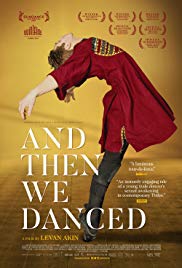
AND THEN WE DANCED
Georgia, 2019, 113 minutes, Colour.
Levan Gelbakhiani, Bachi Valishvili, Ana Javakishvili, Kakha Gogidze'
Directed by Levan Akin.
World audiences do not see many films from Georgia, capital Tblisi. This film has received rather wider circulation and awards at festivals.
As the title indicates, there is a focus on dance. Much of the action here takes place in a dance school in Tblisi, centring on one of the young trainees, Marek (Levan Gelbakhiani), who comes from a dancing family, especially his father who is now a businessman. His brother also studies at the school.
Audiences are less familiar with dancing styles and traditions from central and eastern Europe and will find the rehearsal and performance scenes rather different. Many of them are accompanied by a beating drum, having strong steps, intense physical movement. There is an explanation that this is traditional dancing but has been consolidated during the era of the Soviet Union. The dance has become very masculine, suspicions of any softening, any feminine influence, even with the number of female dancers.
With these aspects, and details of life in the capital, family life and apartments, the role of the older generation, especially the women keeping house and cooking as well as loving support, the expectations of the men to be strong and supportive, the film is an invitation to another world. However, with 21st century changes in social communication, media,, there is much more relaxation in the attitudes and’s lifestyles of the younger generations. (And all of them smoke – all the time!).
Marek is not the most successful of dancers continually criticised by the dance instructor and supervisors. The instructors do not look like dancers but resemble the stereotype of police and secret agents.
Marek dances with one of the young women at the school, friends from their childhood. However, a new, somewhat older, dancer from outside the city, full of self-confidence, take his place in the school and Marek is fascinated.
And so, the film explores themes of sexual orientation, Marek and his understanding himself, acknowledging himself, although his interactions with the newcomer are concealed from the others. There is gossip that another of the dancers, forced out of the closet, has given up his dancing and has become a male prostitute. The culture is homophobic.
And yet, Marek is determined to succeed, despite the criticisms, despite the emotional involvement as well as disappointment at rejection. He goes downhill, self-absorbed, experimenting in drink and sexual behaviour? Though he injures his ankle at rehearsal, he is determined to go to the final audition, persevering the falling, ever more determined to succeed, the final image of him defiant.
The film has interest in terms of Eastern European dance and its traditions and style. It is also an Eastern European exploration of homosexuality and the effect of coming out in Georgian society.
1. A film from Georgia? George and characters, situations, stories? How universal?
2. The setting into blue sea, the dance school, the interiors? Homes, courtyards? Streets, clubs? The countryside?
3. The musical score, traditional music, drums and percussion, the range of songs?
4. The title, tense? Traditional Georgian styles, from the past, the changes during the Soviet period and the consequences? Expectations of dance, performance, of the dances, the instructors, echoes of bureaucracy and strict control?
5. The dancing, the rehearsals, the demands on the dances, the atmosphere for the auditions, men and women, the dancing partners, the spirits, the discipline?
6. Marian’s story? His age, the family, the traditions of dance, his brother also a dancer? The father and his work? The mother at home, the grandmother? David and his being unreliable? The home scenes? Marian and his being self-contained? The friendship with Maria, expectations of their partnership? The rehearsals, his hopes, preparation for the audition, criticisms by the instructor?
7. The arrival of the killer, self-confident, his hearing and its having to be removed, his skill in dancing, his been chosen for particular dances? His story, from the country, his sick father, his girlfriend at home? His age?
8. The range of older women, mothers and grandmothers, neighbours, working in the house?
9. The younger women, more freedom, dancing, parties and partnerships, condom is a sex? Oh and her being pregnant to David?
10. The amount of drinking on the part of the younger people? The enormous amount of smoking?
11. Mari and, his appearance, home life, personality, smoking? The attraction towards the killer, gradual, sharing, talking, comfortable together, going to the countryside, the sleep, the masturbation, the effect, the later sexual encounter? The consequences for each? The possibilities for the future?
12. The story is ours, the dancer, homosexual, his being arrested, going on the streets? Marian on the bus, going to the clubs, the types, the frenzy, the drinking, searching from for it killer?
13. Marie Benders dependence, trying to perfect his dance, his fall, his ankle, Maria helping him, questioning him, his being critical of her?
14. David, older, the drugs, dealing, his being ousted from the dance school, wanting the job, getting married to help him, his being fired? So proactive pregnancy? On, the
family, marriage, the ceremony, the guests are the dancing? Married, it killer present, avoiding each other, the blunt talk, the engagement and it killer is returning home?
15. Married, his injury, his determination for the audition, Maria in the Gallery watching? His determination, the range of dancing, the bureaucrat and his leaving, the instructor and his allowing merit to continue? Marian walking out the door, the freeze-frame – and his future? Maria and her support, weeping?
16. The audition, its effect, married falling, getting up again, making the dance floor feminine, effeminate, contrary to the masculine traditions and expectations? His future, in Georgia, leaving?